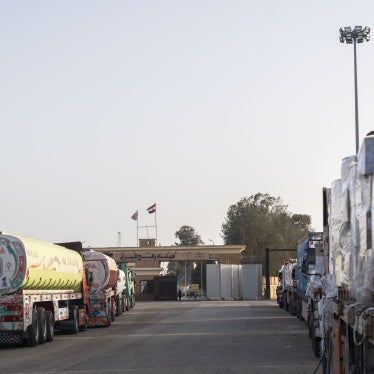If the Prime Minister has refused to apologise for invading Iraq, he should at least accept responsibility for its consequences. Two million Iraqis have fled the violence unleashed by the invasion and occupation. And as the violence escalates, so does the exodus.
Yet, at the beginning of 2007, the British had still given no support either to the United Nations High Commissioner for Refugees (UNHCR), or to Jordan and Syria, the two countries which are currently bearing the main burden and who are both now acting to close their borders to refugees, with which they say they can no longer cope.
There is no British programme for resettling Iraqis in the UK, even for those who have served the UK authorities. And the vast majority of asylum seekers who manage to get here on their own are seeing their applications refused. In the 12 months to September, out of 780 applications processed only 55 were granted some form of asylum.
The British policy on Iraqi refugees is not only morally indefensible, but also extraordinarily shortsighted. Experience from elsewhere - Afghanistan, West Africa, Somalia and Sudan - has shown very clearly that refugee flows on the scale now seen in Iraq can often contribute to serious regional instability.
The last time so many people were on the move in the Middle East was in 1948 in the aftermath of the war which led to the creation of the state of Israel. We are still living with the consequences of that refugee crisis.
Having engaged in a pre- emptive war of choice that directly or indirectly caused this massive displacement, the US and the UK have a clear and compelling duty, as well as an interest, to take the lead in addressing the refugee crisis their actions have precipitated. Belatedly, the US government has begun to pay attention. On 14 February, Condoleezza Rice announced a programme under which 7,000 Iraqi refugees will be resettled in the US this year. It's not much, but it is a start. And the UK must follow suit.
Here's what the UK should start doing now. First it needs to provide financial and logistical support to the Jordanians and the Syrians, as well as to other countries in the region, in order to help them to provide support for Iraqi refugees living in their midst. As Human Rights Watch has documented, refugees from Iraq (including 20,000 stateless Palestinians) need international support and protection, particularly inside Syria and Jordan, where many face acute hardship, a lack of access to education and health services, and discrimination.
Second, the Government should establish its own resettlement programme for Iraqi refugees. Priority should be given to those who have worked for the British authorities in Iraq, who may be particularly at risk of reprisals as UK forces withdraw. One former Iraqi employee wrote in an e-mail in February: "Most of my old CPA, FCO, and DFID colleagues are disappeared, killed or moved out of Iraq, I do not think that I or my family have much luck here in Basra."
Third, the UK needs to review its approach to Iraqi asylum seekers already in the UK. Hundreds of Iraqis have fled the violence and insecurity of Iraq only to be caught up in the legal and bureaucratic nightmare of the British asylum system. According to the Refugee Council, thousands have been denied asylum since 2003. Of those, almost a hundred Iraqi Kurds have been forcibly returned to northern Iraq on the grounds that it is stable there and they face no risk. The rest are waiting in the UK without any clear legal status until the British Government deems that the rest of the country is safe enough to consider returning them home, too.
Finally, a demonstration of the British Government's willingness to help Iraq's neighbours cope with the financial and human refugee burden must be combined with intense diplomacy to convince Jordan and Syria, in particular, to keep their borders open for Iraqi refugees. Both countries already host as many as one million Iraqi refugees each, and both have recently taken measures to close their borders or to restrict residency permits for Iraqis.
Continued British inaction could result in a breach of the most fundamental principle of international refugee law - that refugees should not be forcibly returned into the hands of their persecutors - with all its tragic and horrifying consequences.
It may be too late for this British Government, with its US partner, to succeed in making Iraq a safe place for Iraqis to live in or return to any time soon. But it is not too late for the Government to address a massive refugee crisis that is a direct or indirect consequence of its actions in Iraq.
The author is London director of Human Rights Watch









